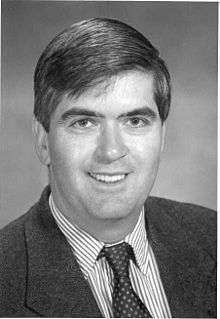George Perry (neuroscientist)
George Perry (born April 12, 1953 in Lompoc, California) is a neuroscientist and Dean of the College of Sciences and Professor of Biology at the University of Texas at San Antonio. Perry is recognized in the field of Alzheimer's disease research particularly for his work on oxidative stress.
Education
Perry received his Bachelor of Arts degree in Zoology from University of California, Santa Barbara. After graduation, he studied at Scripps Institution of Oceanography, Hopkins Marine Station of Stanford University, and the Marine Biological Laboratory at Woods Hole; he obtained his Ph.D from the University of California at San Diego in Marine Biology under David Epel in 1979. He then received a postdoctoral fellowship in the Department of Cell Biology in the laboratories of William_R._Brinkley, Joseph Bryan and Anthony R. Means at Baylor College of Medicine where he laid the foundation for his observations of cytoskeletal abnormalities.
Professional appointments
In 1995, Perry joined the faculty of Case Western Reserve University, where he holds an adjunct appointment. He is dean of the College of Sciences and professor of biology at the University of Texas at San Antonio . He is distinguished as one of the top Alzheimer’s disease researchers[1][2] with over 1000 publications, one of the top 100 most-cited scientists[3] in Neuroscience & Behavior and one of the top 25 scientists in free radical research.[4] Perry is highly cited (over 42,000 times;H=102;ISI/over 62,000 times;H=124;Google Scholar) and is recognized as an ISI highly cited researcher.[5] Perry is editor for numerous journals and is editor-in-chief for the Journal of Alzheimer's Disease. He is fellow of the American Association for the Advancement of Sciences, past-president and interim executive director of the Southwestern and Rocky Mountain Division of American Association for the Advancement of Sciences, Chair of the Board of the National Organization of Portuguese Americans and past-president of the American Association of Neuropathologists.
Research focus
Perry's research is primarily focused on the mechanism of formation and physiological consequences of the cytopathology of Alzheimer disease.[6] He has played a key role in elucidating oxidative damage as the initial cytopathological abnormality in Alzheimer disease. He is currently working to determine the sequence of events leading to neuronal oxidative damage and the source of the increased oxygen radicals. His current studies focus on two issues: (i) the metabolic basis for the mitochondrial damage restricted to vulnerable neurons; and (ii) the consequences of RNA oxidation on protein synthesis rate and fidelity.
References
- ↑ Alzheimer's Disease
- ↑ Article: "Alzheimer's disease research: scientific productivity and impact of the top 100 investigators in the field" by Aaron A. Sorensen
- ↑ in-cites - The 100 Most-Cited Scientists in Neuroscience
- ↑ Lab Registry
- ↑ Researcher ID Profile
- ↑ "George Perry Academic Research (UTSA faculty website)". UTSA.edu. Retrieved 9 May 2014.
External links
- Future Neurolology Interview
- Journal of Alzheimer's Disease
- UTSA Faculty Biography
- TEDXAlamo: Living with Aging on YouTube
- Science Watch Top 20 Alzheimer's Researchers
- PBS Interview
- Express-News Article
|
